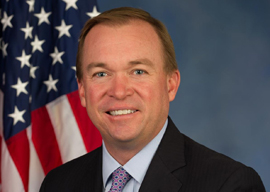
November 30, 2017

Mick Mulvaney
Source: WIkimedia Commons
Elizabeth Warren, call your wigwam.
The Wall Street warrior and Native American wannabe is about to have her baby snuffed out, like the Lakota at Wounded Knee.
The Consumer Financial Protection Bureau, a bureaucratic body created in the brutal aftermath of the 2008 financial crisis to protect the public against big-bank excesses, was in limbo. Departing Director Richard Cordray, an Obama appointee, named Deputy Director Leandra English as his replacement.
President Trump had other plans. As Cordray left the building, Director of the White House Office of Management and Budget Mick Mulvaney was given the dual assignment of running the CFPB along with his own department.
On Monday, it was a showdown at high noon, or rather, 9 a.m. The doors to the agency opened with no clear captain at the helm. Who was the real director of the consumer watchdog? Government runs on predictability. Two acting directors makes for bureaucratic anarchy—the governmental equivalent of a prisoner break at an insane asylum.
It only makes sense that the next step was the courtroom. Sunday night, just before the mismatch was to go into effect, English filed suit, suing to block Mulvaney from taking the head post. The lawsuit didn’t stop Mulvaney from walking into the CFPB Monday morning, doughnuts in hand, and dashing off an email to staff, instructing them to disregard anything English may say under the designation of “Acting Director.”
For all her hand-wringing over her appointment, English spent Monday conspiring with Democratic senators, including Warren. The Massachusetts senator is right to be worried. Warren was instrumental in establishing the foundational structure for the CFPB. Nobody wants to see their progeny gutted by people charged with running it.
Moreover, Mulvaney has a history of being unsparingly critical of the agency. The former South Carolina congressman called the regulatory body a “sick, sad” joke that’s “a wonderful example of how a bureaucracy will function if it has no accountability to anybody.” During his first day on the job, he tore into the CFPB’s legalistic structure, describing it as “unaccountable to the people who are supposed to oversee it or pay for it.”
Mulvaney went further, saying he had “fundamental principled misgivings” about the organization’s structure and lamenting that Congress had little oversight over his position as director. “If you really studied the constitutional nature of our government, you’ve studied the way that the bureaucracy is supposed to work; it would both frighten and disturb you that this agency is as independent as it is,” he warned during a press conference.
Fidelity to our constitutional framework is of little concern to Warren and the rest of the CFPB’s defenders. Mulvaney is seen as an existential threat to the agency. He’s not so much a fox in the henhouse as a rapist running a convent.
Mulvaney’s criticism is, however, apt. The Bureau was deemed unconstitutional by a federal appeals court back in October. The position of director is insulated from Congress and isn’t governed by a separate independent body, as per other executive agencies. In the court ruling, Judge Brett Kavanaugh wrote that the “Director of the CFPB is the single most powerful official in the entire U.S. Government, other than the President.”
No wonder there’s a tug-of-war going on for control of the agency. Being director of the CFPB is like being master of the financial universe, with near-unilateral authority to crack down on dubious banking practices.
In some ways, the power is justified. The risk-taking and reckless lending in the lead-up to the financial crisis demonstrated a willingness by Wall Street traders to play chicken with Washington. With the stakes high and the money hot, lenders, packagers, and bean counters used all types of complicated financial instruments to repackage and sell mortgaged-backed securities in excess, sloughing off risk on a bet that weak-kneed lawmakers would cover their behinds if things went south. And south they went. When the bottom fell out of the subprime-mortgage market, it was taxpayers left holding the bag.